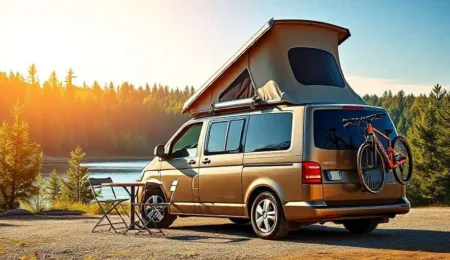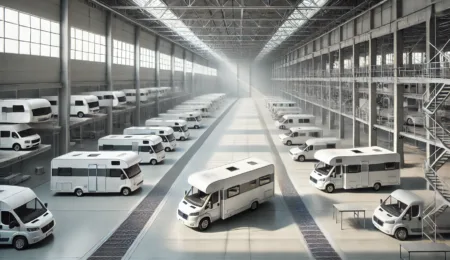
Your Adventure Awaits! Find the Perfect Van to Build the Camper of Your Dreams Today!
Creating a camper van from a suitable base is an exciting process and can become a personalized adventure experience. In this article, we’ll explain how to classify the most in-demand vans for conversion, covering essential aspects like model selection, types of bodies, recommended engines based on added weight, and the best materials for construction, including lightweight woods and insulation. If you’re looking for the ultimate guide to transforming your van into a home on wheels, you’re in the right place!
How to Classify Vans for Camper Conversion
Vans commonly used for camper conversions are usually classified by size, body, and engine. Evaluating these aspects is crucial to decide if the chosen model is suitable to meet your expectations and has the necessary space for the elements you need in your camper. Vans for camper conversion can generally be classified into three main groups:
- Small vans (such as the Renault Kangoo or Citroën Berlingo)
- Medium vans (such as the Volkswagen Transporter or Ford Transit Custom)
- Large vans (such as the Mercedes-Benz Sprinter or Iveco Daily)
1. Small Vans
Small vans are a good option if you’re looking for a compact camper for short getaways. Models like the Renault Kangoo or Citroën Berlingo stand out in this size category. These vehicles are easy to handle, ideal for urban environments, and easy to park.
Key features of a small van:
- Limited space: Due to their size, they often lack enough room for a fixed bed or a complete kitchen.
- Multi-purpose: Ideal for those who want something they can also use daily.
- Compact body: With a lower and shorter body, these vans are less suitable for fixed elements.
2. Medium Vans
In this category, you’ll find some of the most popular vans for conversions. Models like the Volkswagen Transporter or the Ford Transit Custom offer a good balance of size and interior space, perfect for those seeking a more versatile vehicle for multi-day trips. These vans allow for a foldable bed, a small kitchen, and storage space.
Features to consider in a medium van:
- Intermediate size: Offers enough space for a fixed bed and a basic kitchen without being too large to maneuver.
- Good performance: Most of these models have efficient, versatile engines.
- Adjustable height and length: Many come in high-roof versions for better vertical space use.
3. Large Vans
Large vans like the Mercedes-Benz Sprinter or Fiat Ducato are perfect for camper conversion projects that aim for an experience closer to that of an RV. With their large interior capacity, they allow for multiple amenities like a permanent bed, full kitchen, and even a bathroom.
Characteristics of a large van:
- Ample space: Perfect for a fixed bed, full kitchen, bathroom, and storage areas.
- Powerful engines: Designed to carry heavy loads, making them ideal for fully equipped camper conversions.
- Several height and length options: Often available in various length (L) and height (H) configurations.

Understanding the L and H Codes in Van Bodies
One of the most important technical aspects when choosing the ideal van for a camper conversion is understanding the L and H codes in its body classification. These letters refer to the length (L) and height (H) of the van, and each manufacturer offers various sizes to adapt to different needs.
- L1, L2, L3, L4: These indicate the van’s length, with L1 being the shortest and L4 the longest.
- H1, H2, H3: These indicate the van’s roof height, with H1 being the lowest and H3 the highest.
What does this mean in practice?
- L2H2: A van with medium length and height, suitable for living space without being overly large.
- L3H2: Ideal for those seeking a more complete camper with space for a fixed bed and additional storage.
- L3H3: Perfect choice for those who want enough height to stand comfortably, ideal for an RV-like experience.
Recommended Engines Based on Added Weight
Choosing the right engine for a camper van is essential, as the extra weight from equipment and materials directly affects the vehicle’s performance. Generally, diesel engines are preferable for camper vans due to their fuel efficiency and durability. Here are some general recommendations based on van size and expected weight:
- Lower power engines (75-100 HP): Ideal for small vans with little additional weight, like a bed and some lightweight furniture.
- Intermediate power engines (100-150 HP): Perfect for medium or large vans that require a balance of efficiency and power.
- High power engines (150 HP or more): Recommended for large vans with a full build-out, including fixed beds, kitchen, bathroom, and storage furniture.
Materials for Camper Van Construction: Wood, Insulation, and More
Once you’ve selected the right van model, the next step is to choose the right materials to build a lightweight, efficient camper. Below are some of the most common materials used in homemade camper van construction.
Types of Lightweight Wood for Camper Build-Outs
Wood is essential for building furniture in a camper. It’s important to select lightweight woods that won’t overload the vehicle but are still strong enough to withstand daily use.
- Plywood: One of the most commonly used woods in camper builds due to its light weight and durability. Thickness can vary depending on the furniture being constructed.
- Birch wood: Known for its durability and lightness, perfect for building structures like beds and cabinets.
- Pine wood: Very light and easy to work with, although less durable. Ideal for finishes and decorative details.
Insulation for Camper Vans
Insulation is key to ensuring that the camper is comfortable in any climate. Several materials are suitable for insulating a camper van:
- Rock wool: Great thermal and acoustic insulation, though heavy and not moisture-resistant.
- Polyurethane foam: Excellent thermal insulation and moisture-resistant.
- XPS or EPS (extruded or expanded polystyrene): Rigid, lightweight materials with excellent thermal insulation.
- Armaflex: This self-adhesive material is ideal for camper vans, as it’s moisture-resistant and adapts well to curved surfaces.

Considerations for Interior Equipment
Once you’ve set up the van structure and insulation, it’s time to decide on the equipment you’ll need. Below are some recommendations for optimizing space and making your camper a home on wheels.
Essential Furniture for a Camper Van
- Bed: The bed is one of the most important pieces in any camper. There are several options:
- Fixed bed: Ideal for large vans, as it takes up space but offers comfort.
- Foldable bed: Perfect for maximizing space in medium or small vans.
- Convertible bed: Functions as a sofa during the day and converts to a bed at night, ideal for space optimization.
- Kitchen: Depending on available space and needs, you can choose between a fixed or portable kitchen. Some options include:
- Gas stove: Practical and affordable.
- Electric stove: Ideal if you have a renewable energy system.
- Portable stove: Can be moved inside or outside the vehicle, useful for small campers.
- Bathroom: Large campers may have space for a bathroom, although smaller vans may use a portable toilet.
- Smart storage: Use shelves, compartments, and drawers to maximize available space.
Electrical System in a Camper Van
To have a functional camper, you need an electrical system that supports basic needs like lighting, device charging, and running appliances. Ideally, this system should include:
- Auxiliary battery: Powers devices when the vehicle is off.
- Solar panels: A sustainable, useful option to keep the battery charged.
- Power inverter: Converts battery energy to connect AC devices.
Safety and Legal Considerations
To ensure your camper van complies with regulations, you’ll need to follow certain legal guidelines, especially if you want to certify it. Important elements include:
- Fire extinguisher: Required in many countries and an essential safety measure.
- Carbon monoxide detector: Ideal if you use gas heating or cooking.
- Certification regulations: Check local laws for certifying camper-converted vehicles.
Conclusion
Converting a van into a camper is an exciting decision that offers the opportunity to create a unique space tailored to your needs. From choosing the right model to details on insulation, equipment, and materials, each decision is important to make your camper a comfortable and functional space. With this guide, you’re ready to start the journey of transforming your van into a true home on wheels.





Leave a Reply